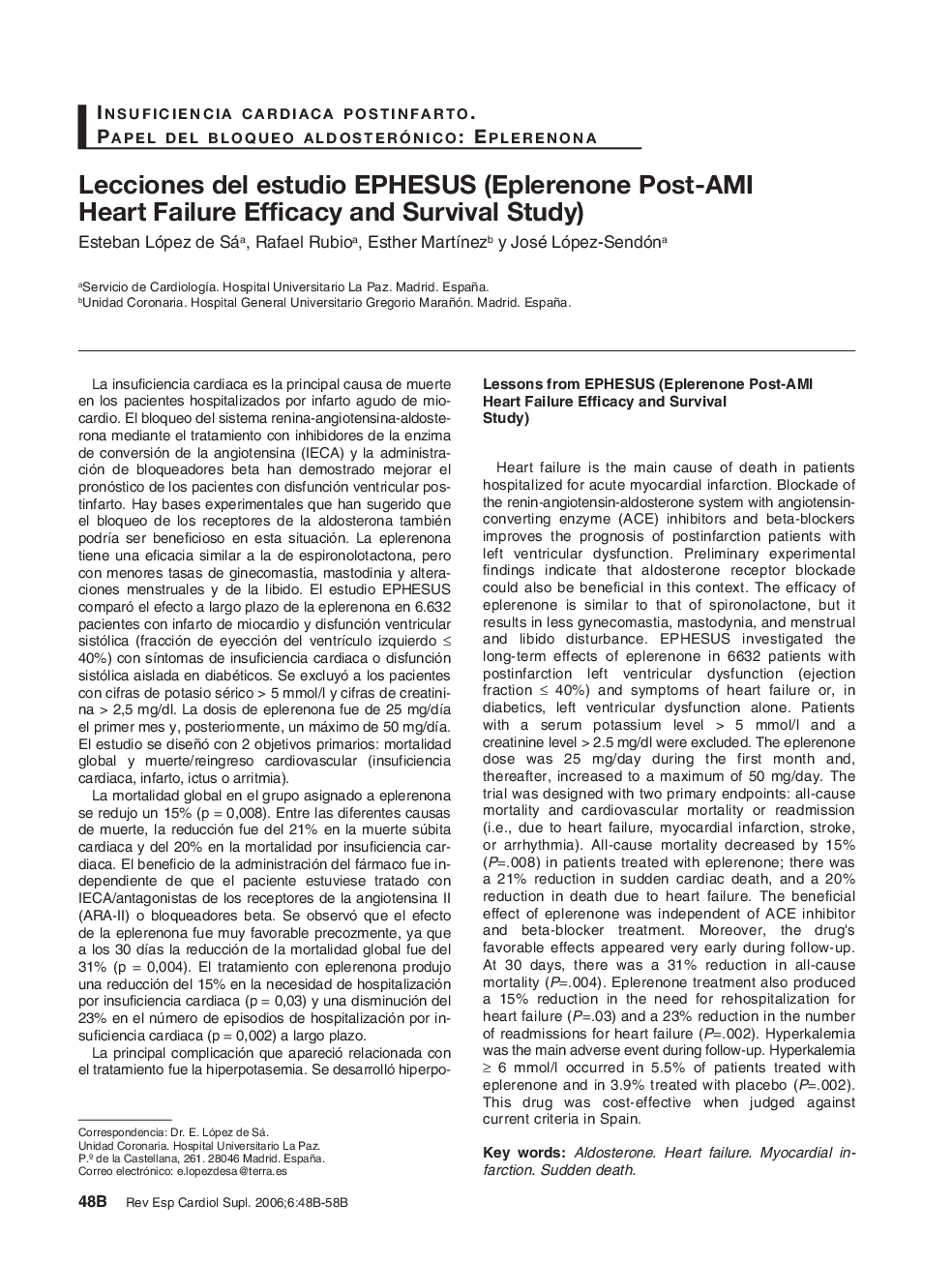| کد مقاله | کد نشریه | سال انتشار | مقاله انگلیسی | نسخه تمام متن |
|---|---|---|---|---|
| 3019738 | 1182257 | 2006 | 11 صفحه PDF | دانلود رایگان |
عنوان انگلیسی مقاله ISI
Lecciones del estudio EPHESUS (Eplerenone Post-AMI Heart Failure Efficacy and Survival Study)
دانلود مقاله + سفارش ترجمه
دانلود مقاله ISI انگلیسی
رایگان برای ایرانیان
کلمات کلیدی
موضوعات مرتبط
علوم پزشکی و سلامت
پزشکی و دندانپزشکی
کاردیولوژی و پزشکی قلب و عروق
پیش نمایش صفحه اول مقاله

چکیده انگلیسی
Heart failure is the main cause of death in patients hospitalized for acute myocardial infarction. Blockade of the renin-angiotensin-aldosterone system with angiotensinconverting enzyme (ACE) inhibitors and beta-blockers improves the prognosis of postinfarction patients with left ventricular dysfunction. Preliminary experimental findings indicate that aldosterone receptor blockade could also be beneficial in this context. The efficacy of eplerenone is similar to that of spironolactone, but it results in less gynecomastia, mastodynia, and menstrual and libido disturbance. EPHESUS investigated the long-term effects of eplerenone in 6632 patients with postinfarction left ventricular dysfunction (ejection fraction ⤠40%) and symptoms of heart failure or, in diabetics, left ventricular dysfunction alone. Patients with a serum potassium level > 5 mmol/l and a creatinine level > 2.5 mg/dl were excluded. The eplerenone dose was 25 mg/day during the first month and, thereafter, increased to a maximum of 50 mg/day. The trial was designed with two primary endpoints: all-cause mortality and cardiovascular mortality or readmission (i.e., due to heart failure, myocardial infarction, stroke, or arrhythmia). All-cause mortality decreased by 15% (P=.008) in patients treated with eplerenone; there was a 21% reduction in sudden cardiac death, and a 20% reduction in death due to heart failure. The beneficial effect of eplerenone was independent of ACE inhibitor and beta-blocker treatment. Moreover, the drug's favorable effects appeared very early during follow-up. At 30 days, there was a 31% reduction in all-cause mortality (P=.004). Eplerenone treatment also produced a 15% reduction in the need for rehospitalization for heart failure (P=.03) and a 23% reduction in the number of readmissions for heart failure (P=.002). Hyperkalemia was the main adverse event during follow-up. Hyperkalemia ⥠6 mmol/l occurred in 5.5% of patients treated with eplerenone and in 3.9% treated with placebo (P=.002). This drug was cost-effective when judged against current criteria in Spain.
ناشر
Database: Elsevier - ScienceDirect (ساینس دایرکت)
Journal: Revista Española de CardiologÃa Suplementos - Volume 6, Issue 2, 2006, Pages 48B-58B
Journal: Revista Española de CardiologÃa Suplementos - Volume 6, Issue 2, 2006, Pages 48B-58B
نویسندگان
Esteban López de Sá, Rafael Rubio, Esther MartÃnez, José López-Sendón,